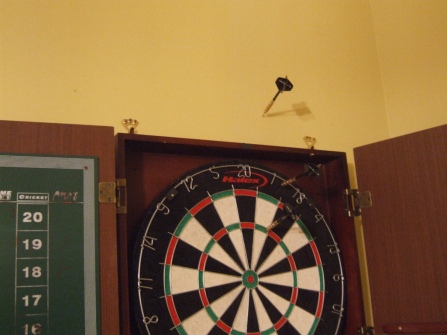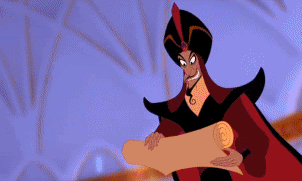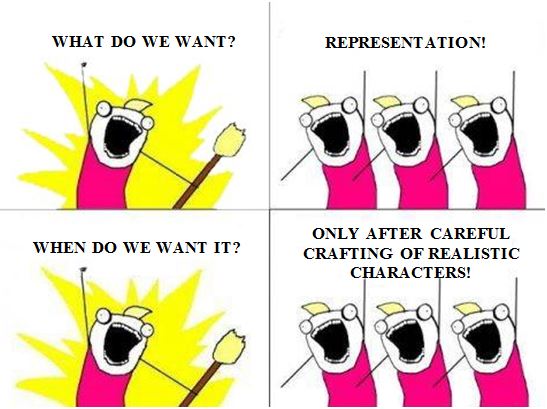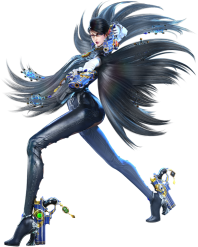A few weeks ago, I wrote an article about how I wanted game developers to show more creativity when designing games. I wanted them to stop looking at “first person shooters” as a way to beat people over the head with predominantly “male” themes, and to stop looking at “match three games” as a way to beat people over the head with predominantly “female” themes. So I readied my dart, took careful aim…

…and missed.
Instead of sparking a conversation about whether or not there is a difference between a mechanic and a theme, and whether themes are mistaken for mechanics when trying to develop or market a game, folks started talking about all the complex social issues surrounding gender and games. We talked about how the important women in our lives played “male” games and liked them just fine, and about how marketing is usually aimed at one group or another. We talked about the gaming industry as a whole being inclined toward males. And a few – just a few – touched on harassment in the community.
In response, I dug a little deeper and decided to approach this topic from a different angle. So I started doing some more research and…

Holy Maker, there are a lot of things to consider when talking about gender, sexuality, representation, and video games.
“Representation” is a word that gets used a lot to mean “diversity,” in regards to gender, skin color, sexual orientation, and other easily-recognizable attributes of different groups of people. But is it enough to stick a “minority” into a game and claim representation? While, yes, that minority now has technically been included in the mainstream game, that’s not usually considered enough.

People then ask for “realistic portrayals” and “less stereotyping.” If you followed all the GamerGate drama (a topic for another post so please hold your fire in the comments), you’ll know that just sticking a woman – for instance – into a game isn’t enough. It’s how she is being portrayed that is the issue. And so it is with any group of people, majority or minority.
But what does that really mean? Well, quite a lot. So much, in fact, that we have another two-part topic on our hands. Today we’ll be playing it nice and safe and talking about the importance of identification in video games, and next time we’ll talk about whether identification is important, what it means for “representation” in games, and some societal implications of what we’ve learned.
Please note: I will be discussing this issue using generalizations, as any research you look up in this area deals with “averages.” There will always be individuals who fall outside the average, but that does not mean that these experiences are not true for other/the majority of people.
A Definition
Identification can have a few different meanings when applied to a person or a social group. It can refer to either accepting the rules/norms of a social group as one’s own beliefs, or it can mean regarding the characteristics of another person as yours. In other words, you “see yourself” in another person.

After reading through the discussions from my “Playing Like a Girl” article, I began to really wonder why women – myself included – never really raised the issue of wanting more female protagonists, but then when given the option to play as a female character, they took it. I also wondered why some men choose to play as female characters, and some have claimed (anecdotally) that they connect with their female PCs moreso than their male ones.
When talking specifically about fictional characters, another little detail is added that can make a world of difference. A person looks at a character and either identifies with them or identifies as them.
That is the distinction that this article will seek to clarify. We will also explore when and whether “identifying as” and “identifying with” characters are important for an audience to experience.
Identifying “As”
When people identify “as” something, usually we mean specific demographic information, such as gender, heritage, height, right- or left-handedness, the color of our skin or hair, whether we wear glasses, our job, our social class, our sexual orientation, and other details like these. These attributes are usually superficial and don’t represent who we are, but rather what we are. I may identify as a woman who wears glasses, but that doesn’t mean that I “see myself” in any character who is a woman who wears glasses.
For instance, Bayonetta is a woman and wears glasses, yet when I look at Bayonetta I do not see someone “like” me. We share some surface characteristics, but that’s not enough for me to think she is a representation of me or of women who wear glasses.

This is the trap that some purveyors of games fall into: they believe that putting someone with surface characteristics of a particular group into a game is enough to answer any questions about “representation” in games. Granted, this is a first step. But to stop at that point is not only selling your characters short, but can also cause some unintended harm to the “underrepresented” group (which we’ll talk about more in depth in the upcoming post on representation).
Identifying “With”
Some of you may have come across an instance of hearing someone – usually in a minority group – complain that their representation in a game or other media product isn’t “realistic.” Barring the blatant and inappropriate use of stereotypes to “represent” a group, what these comments usually mean is that they can’t identify with the character in the group.
To identify with a character, it means we must empathize with the character. That is, we need to see something in them that we also recognize in ourselves. When we identify with or empathize with a character, we’re trying to bridge the differences between us and them. So this means that we must see a similar “personal” characteristic, rather than a similar “demographic” one.
The character maybe has a strong work ethic, or a devotion to family. Perhaps they share a personality characteristic or flaw, or believe in similar values. They can even embody a characteristic that we wish we had, or are striving to develop in ourselves. Whatever the similarity, we can appreciate the trait because it is personal and meaningful to us.

This identification with a character transcends gender, physical appearance, and other “demographic” information. I’m not a straight male (surprise!), but I’ve really never had a problem identifying with the male characters in the games I play, because I can appreciate traits like “giving of yourself to help others” (inFamous), “fighting for your family’s sake” (Shadow of Mordor), or “continuing doing your job even when it’s not quite what you expected” (Metal Gear Solid: All of Them).
Identifying with a character can happen for a moment, or for the duration you are involved with the character. For instance, maybe you don’t identify as a gay man, but when Dorian from Dragon Age: Inquisition says his father wanted to use blood magic to “change” him… Well, there might be someone out there who has felt that they disappointed their parents simply because of the way they live their lives. Perhaps for that moment (or the whole game) that person identified with Dorian’s crushing disappointment in and negative relationship with his father.
Reasons to Differentiate
Identifying as is much different than identifying with. Just because a character is a straight, white male doesn’t mean that every straight, white male will look at him and feel “represented.” Voldemort is a straight, white male from England, but I haven’t really met anyone who says that Voldemort is a good representation of straight white men from England. Why?

His personality, his values, and his actions are not representative of you or the straight, white, English males you know. Thus, you can’t identify with him, even though you might identify as straight, white, male, English, or a combination of those four.

Does It Matter?
But Athena, I hear you typing. I’ve played (fill in name of game) and not cared about representation. I just enjoy the game for what it offers. I enjoy playing games and escaping from reality. If being represented in a game is so important to you, you’re not playing games right.
You’re right. Some people don’t look for representation in games. It doesn’t matter to some folks, regardless of their gender, orientation, heritage, age, or hair color. Games are experiences that we each have independently of other people (usually), and so if the game is providing us what we want, that’s all that matters, right? Well… not exactly.
So… Does It Matter?
This article has talked quite a bit about the micro-level of this issue. We learned about identifying as versus with. And perhaps to a certain group of individuals, identification doesn’t matter.
But video games don’t exist in a vacuum. We may play by ourselves or with a small group of friends, but we are part of a larger society. Video games are part of a larger media heritage.

So the short answer to the “does it matter?” question is yes. Identifying with and as characters in media is important. When analyzing media, a macro-level approach is key to not only understanding media themes, but finding and addressing societal flaws brought to light by the analysis of the “bigger picture.” And that’s where the discussion gets interesting.
Join us for part two to discuss the importance of representation in video games!
Have you ever identified WITH a character? How about AS a character? Has it changed how you viewed the game? Do you think identifying with media characters matters? Let me know in the comments!
Thanks for stopping by, and I’ll see you soon!
~ Athena
Is your subscription to our blog not enough? Do you want more AmbiGaming? Of course you do! So you should definitely check us out on Twitter @TheAmbiGamer or subscribe to follow our Let’s Play adventures on YouTube!


“So I readied my dart, took careful aim…”
I’m not entirely sure why, but I burst out in laughter by that sentence and the picture 😀 Kudos!
LikeLiked by 1 person
Glad you liked the humor! 😀
LikeLiked by 1 person
Jesus, who wants to read long posts about non-fun issues in Gaming? Read the room, Athena, read the room….. 😉
I jest, obviously (stones and glass houses and all that!) – and I thought this was a great piece. I agree with everything you’re saying, but for me, I think whilst it’s definitely important to have characters you can pro-actively identify with, or as (for PCs/significant NPCs), and for representation to be fair and realistic, it’s as much an issue from the other side of the coin – i.e. what happens when certain “representations” frequently feature few-to-no relatable or identifying-with-or-as characteristics.
The former has a positive impact (yay, I can finally play as somebody who I can identify with, or as), for sure, but the latter has a negative, cumulative impact (I’ve never once identified with any representation of x in a game). This is why lazy generalisations, tropes and stereotypes are dangerous, I think, because they can have a drip-drip effect when they’re included negatively. To use a less serious example (and because you brought up English White Male) – there’s usually a fairly big chance that when they rock up in popular culture, they’sa be a baddie intent on global domination – yet, in my many years in the UK, I never once met a Supervillain who owned a hollowed-out volcano.
I get the feeling you’re probably going to cover this more in the next piece though, so I’ll shut up about it now!! 😉
LikeLiked by 1 person
Excuse me, Mr. James Dixon, but I *only* post about fun gaming issues! 🙂 I’m having a blast, aren’t you?? haha
Thank you for your thoughtful comment. This is definitely a complicated issue, because, like you said, *how* representation is used is important, complex, and identifying with/as a character is not always important for a story to progress. Do you really need to identify with or as Mario to save the Princess? And how many fat Italian plumbers with big mustaches and fun caps are jumping for joy that they are finally visually represented in a game?
And I never understood why English accents always meant a character was bad. Over on this side of the pond, people tend to like English accents quite a bit. But you’re right that any stereotyping is bad, especially when pushed so hard (purposefully or not) by media (any media).
Yes, this will be coming up again in a few weeks, so stay tuned (Mass Effect Month is coming up, so I have some other topics to jump into 😉 )
LikeLiked by 1 person
I love how you deconstruct all of these potentially complex issues. I’ve thought about the dichotomy of identify “as” vs. identify “with,” but never really separated the issues out. There are definitely characters I identify with who aren’t my demographic at all, but due to empathy and connection, I feel closer to them then characters who more resemble my outward appearance. And of course this in no way says that diversity isn’t important (it certainly is), I could just mean that even more is necessary to fulfill the full spectrum of human experience. I can’t wait for the next part.
LikeLiked by 1 person
Thanks! I’m glad the information is presented in an understandable way. So many times I’m reading articles on topics like this thinking that the author could have spent just a little more time breaking down the issue into chunks and been a lot more effective. It’s goo to hear I’m not falling into that trap (yet?).
Representation is a tricky thing, to be sure, because no one can really tell *what* a person will identify with at a given time. I think that’s why it’s so important to write realistic characters, because we can relate to real people. I agree that diversity of the physical characteristics of characters is also important (coupled with non-stereotyped portrayals), but that’s a topic for part two! Thanks for your perspective, as always 🙂
LikeLiked by 1 person
A well organized article that breaks information down in a cohesive manner is quite a gift to the writing world 🙂
LikeLiked by 1 person
Gee, I don’t know if I identify “with” any video game characters. Let me think about it… Hmm. *checks username and avatar* Oh, right! How could I ever forget about Lightning 🙂 I have glasses and I’m a woman so I can definitely see myself “as” Bayonetta (yeah, I wish I looked like that IRL, haha). Oh and Mulan is my favourite Disney movie! She inspired little kid me.
Honestly, I never really thought about the difference between identifying “with” and “as”. I think I’m still confused about the difference though. Using my badass idol as an example, I felt a connection to her character mostly because she seemed to behave like I do. I could empathize with how she was feeling, since I often feel the same, and I could understand why she was acting a certain way in the game. That seems like a definite “with” to me. She’s also a woman with a military background, like me, so that would kind of be an “as” too, right? Help me out here, oh wise Athena 🙂
Since the FFXIII games get a lot of hate from other gamers, it’s entirely possible that this connection I feel to Lightning is why I love the games and wasn’t bothered by the issues other people had with it. I never really thought identifying with characters was important, until I discovered Lightning during a dark time in my life. I’ve always seemed to like traditionally male dominated things (my parents were awesome and let me choose the much more interesting action figures over boring Barbie dolls, haha), so I guess I just ignored how little representation of relatable female characters there were in games while I was growing up. I’m very pleased to see the industry is improving in this regard though.
LikeLiked by 1 person
“Wise Athena”? Yes, thank you for feeding that ego… haha
I’d say you have the difference between identifying “with” and identifying “as” firmly understood! But if it helps, you can think of “with” meaning you identify with characteristics “within” a person/character, and then “as” is the other one (haha). I didn’t know you had a military background. That’s cool.
You’re right that maybe it’s not always important to forge connections with a character, but I definitely think representation it still has a place, as well (at the very least, it has a place in society and media in general). It was never something I thought about much growing up, either, as my parents are pretty liberal and we never had to “conform” to any sort of gender roles/etc. We were treated equally and expected to learn all the same skills (i.e., learn to use power tools and learn to cook, because we needed to be “self-reliant adults”). I became more interested in media representation when I grew up, went out into the real world, and saw how “real” people sometimes treat each other. I’m glad things are continuing to move forward, too!
LikeLiked by 1 person
Well, I’ve certainly learned a lot from you so I’d say you earned “The Wise” title 🙂 Yay! I’m glad I understand something (I’m a little slow some days, haha). So it seems I identify “with” and “as” Lightning. Interesting!
I was in the Canadian Army Reserve Infantry for 5 years during high school/college. I never saw actual combat or got sent overseas. The Reserves here is just like part time army training to protect home soil, unless you do actually volunteer for a tour overseas (or if World War III happened too, I guess). It was still an experience I’ll never forget, and it sure beat working at McDonalds or something, haha. It pushed me past my breaking point on many occasions, but it turned me into a stronger person I think. I also got to fire real assault rifles/machine guns, and throw live frag grenades. Ultimately, the army life was not for me so I didn’t join full time, but I’ll treasure those memories forever (even the miserable ones, haha).
I find gender roles a very outdated and annoying concept. It’s great you were free of that too.
LikeLiked by 1 person
Well thanks 🙂
That’s really neat that you did that. It certainly sounds like an experience! (And still a better one than flipping burgers, I’m sure). You sound like you got to be a regular G.I. Jane!
LikeLiked by 1 person
Great post. Entertaining as usual. I must admit when I play female protagonist, it feels more natural to me. So I normally create female avatar if I have the choice, however, when it comes to playing horror video games, I like playing as a man 😊. I feel more powerful so I am not as scared.
But you are right, I think there should be more representation overall. I just have always been a bit passive about this type of thing because I prefer to be the observer not the doer.
As for the character I can relate to–my avatar. Lyon, from Suikoden V. She is a bodyguard for the prince who is the protagonist.
LikeLiked by 1 person
Thanks for sharing your experience! We’ll be exploring this personal vs social “need” to relate to characters in the next post, so I’m glad for your comments 🙂
And your character from Suikoden V sounds pretty tough… haha
LikeLiked by 1 person
Hey thanks! There are many interesting characters in Suikoden series! I highly recommend the series if you are into characters and story. 🙂
LikeLiked by 1 person
My apologies, if I sound a bit sexist in the above comment–I am not physically strong in real life–so any male characters seem to have more strength than me.
LikeLiked by 1 person
You didn’t sound sexist at all! I may be a feminist but I also know that men are physically stronger than women! 🙂 It can be nice to have a character who “compliments” you, too, especially if you’re thrown into a situation where you might feel uncomfortable in real life.
Also, you’re relating to your avatar, so that’s pretty cool no matter what else is going on 😉
LikeLiked by 1 person
Well I am actually glad to hear this! When I submitted the comment, I realized there are some strong female characters in video games. Amazon from Dragon Crown is one of them. 🙂
LikeLiked by 1 person
I can’t say I have felt represented by a character, maybe I share similar traits but I’m not looking for characters who represent me. What I think is important is more of a connection with a character in struggles they are going through.
This may be a strong opinion, but reading your article it made me realize two sides to this.
1) game companies try to portray their games as representing a certain group of people through shallow means, such as here is a white male in a game, therefore all white males can connect, GREAT!
2) players who look for representation in a game, for example, a white male looking for a white male to play, again shallow
I can see your article saying that it may be game companies laziness in doing this properly, but at the same time, a player can very much take a very lazy approach to finding that representation given the examples. It has to be a 2 way street I suppose, not sure if my point makes sense
but as you said, you can go deeper as a developer and provide the whole disappointing your father representation, and as a player, maybe this is not something you actively look for, because how will you know that without talking with that character in game, but stumble on it by chance, and realize then and there you really can relate to this character. I think it’s much more organic for the flow to work that way. But again I’m sure what I’m describing is not what everyone looks for and more of a personal preference for me.
LikeLiked by 1 person
Thanks for your thoughtful comment! I appreciate strong opinions; I tend to have them myself 🙂
Your points are interesting, although I’m not sure I think any of this has been done to intentionally exclude people. I think game devs realize that heterosexual white males are *probably* the largest audience they have, and so they try to market to them, thinking that men would not want to relate to women, white people would not want to relate to non-white, etc. (and this might have been the case at one point). I don’t think it comes from a place of purposeful exclusion or hatred of minorities. I think a formula has been set and is followed (either due to laziness, as you posed, or not realizing that times have changed a bit – which is its own type of laziness).
Some other folks here have commented about relating to characters who share similar values (identifying *with*) regardless of physical traits, so I would tentatively agree that story elements are *most* important for identification on a personal, player-by-player level. And good storytelling simply dictates that you don’t SHOVE personality traits down an audience member’s throat, so I agree that an organic discovery of a character will be more powerful than being told everything from the beginning.
And regarding your example of players taking a lazy approach to seeing themselves in a character, I think if that’s the case, it’s on the game devs to provide a little variety, expose players to new ideas, and level the field a little, just like in society where the folks in charge must be the ones to impose equality where there is inequality. But that’s an entirely different discussion!! Hope to see you around for the second part of this topic!
LikeLiked by 2 people
I am a straight white male, yet even so, I haven’t run into a video game character that looks like me since Xenoblade’s Dunban. Even so, I don’t have much problem problem identifying with video game characters. Granted, my ability to actively immerse myself is strong, but even so, it doesn’t necessarily take a character that checks off the same boxes the player does to step into their shoes.
I’ve spent a few years by now with an idea for a post on female protagonists tumbling around in my head, but never found the right moment to put it together, so hey, glad for a chance to use some of those topics now! Yes, identification is important. I was going through some poverty research lately, and yeah, studies have shown that just seeing ‘people like you’ have success, even in stories, leads to better performance on tests and, assumedly and by extension, better performance in life matters. That comes from everywhere, news, general life stuff, and the media we consume.
And having main characters that are all the same is not that great from a creative perspective, either. It’s hard to build an iconic character out of the bald space marine archetype or the white 30-something brown-haired dude with 5 ‘o-clock shadow just because those have come up so often that nothing stands out there anymore. Since those are so common, it’s hard to visually pull any personality out of them, too. Which is sometimes what the designers are going for but more often, it’s just a bit of a pain.
That said, it’s not just a simple factor to be making more diverse protagonists. Particularly in the case of female protagonists, there are a horde of complicating factors to go through. Overall representation in any for-profit media is reflective, not prescriptive, and it generally wouldn’t be sustainable otherwise. And yeah, there are a lot more challenges to putting in female characters than it seems from surface level. There’s a lot of business concerns (i.e. the studies showing what proportion of players are female are so broad to be useless in marketing decisions, marketing knowledge holds that young girls are more likely to connect with men than young boys are to women), creative concerns (i.e. videogame protagonists are largely more generic than other characters and in storytelling men are the generic gender while women are usually automatically special, both sides of the audience are way more critical of women characters in leading roles and male characters in supportive roles than the inverse), and social concerns (i.e. videogames are violent and we as a culture are far more comfortable with men receiving violence than women, the movement calling for more diversity are specific about how those characters should be represented which is both creatively limiting and makes incorporating them more risky), and it’s not just a simple matter of making a woman instead of a man and calling it a day. For the industry as a whole to be taking this on, it’s going to take a combined cultural and industrial shift. One that’s definitely within reach, it wouldn’t be much of a shift, compared to a lot of the movements that have gotten us thus far, but it’s still far more complicated than a lot of people seem to realize. And it really, really doesn’t help that the loudest voices on both sides of the argument do more good for the opposite side than they do for themselves.
LikeLiked by 1 person
You’re right that on a case-by-case basis, a character doesn’t need to look like a person for that person to identify with him/her. After all, our strongest interpersonal bonds are with people who are like us “on the inside,” regardless of outward appearance. From a societal standpoint, like you mentioned, I think having that visual “checkbox” is important, too, especially for minorities who are often judged based on appearances (for examples: a black or African-American person, a woman (sort of), an Arab, etc.). In these cases, the physical representation in the game/media is important, but so is portraying them as “regular people.” Likewise, for minorities based on traits, like religion or sexual orientation, I think it’s important for characters in those minorities to have “normal people” traits, but I don’t think that the physical traits are *as* important across the board. I’ll be talking about this a little more with the part 2, so I’m glad you brought this up!
And you are absolutely right that there are so many considerations in regards to portraying women (and any minorities) in video games. So it’s good that these conversations are happening. I wonder, too, if some of this “marketing knowledge” is a result of social stereotypes, expectations, and gender roles out in society. At what point do we stop the cycle and try to move forward? I leave the business analysis to you, but I will agree that there is a big social piece that needs to be addressed, as well.
I’m also not surprised that women are more easily criticized when they are in leading roles and men when they are in supporting roles. Again, this relates back to society, in my opinion, because women aren’t “supposed” to be in the leading role, and men aren’t “supposed” to be in a supporting role. So when those sexist comments come up, (“He’s weak because he listens to her,” “She’s a (insert word of choice) because she’s so assertive”), that’s the time for commentators to step up and point out that if the roles were reversed, the assertive man would be a hero, and the woman who listened to him would be just dandy.
I agree that the loudest voices do more harm than good, which is why I think that more “moderate” commentators need to join the fray. People will eventually listen to a reasonable voice that can appeal – and assuage – to the “anger” on both sides of an issue.
I’m looking forward to reading your article about female protagonists!!
LikeLike
Excellent points raised, excellent post, excellent discussion.
As someone that is not typical, I do want to see more representation for everyone in the lgbtqa+, and made so appropriate and with depth.
I think it really matters, I’ve identified with and as a character multiples times, and in those moments is when they really reach deep and make me cry, regardless of where they came before. Identifying with is the most powerful to me, but identifying as can’t be discarded for sure.
Interestingly, representation and identify with moments for me have been strongest on indie or free games. Crooked Man spoke to me on a very deep level, as it talks about depression, even tho the main character is a male, american and etc. So issues can bridge the gap and connects people in a way no other can, because we fundamentally understand what is usually not understood.
Sorry for the huge ass, rambly reply :’D
LikeLiked by 1 person
Thanks for your in-depth response! Not rambling at all! 🙂
Identification is important for that emotional tug, and I think that the indie scene does have a little more freedom when it comes to who and how they can represent. AAA can surely get there, as well, it’s just a multi-faceted issue that seems difficult to persevere through!
You’re right that having a similar life experience to a character can help with identification. Any sort of experience the character has that resonates with us will always help us identify with them!
Hope you see you for part two when we tackle more of this issue!
LikeLike
I’m glad I didn’t ramble too much 🙌
I’ll definitely have my eyes peeled for part two! 🙋
LikeLiked by 1 person